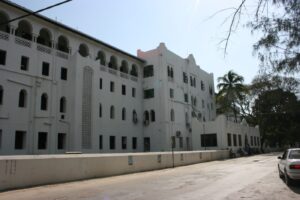
Mtwara, Tanzania:
Mtwara Regional Commissioner, Ahmed Abbas has touted Exim Bank as a link between Tanzania and Comoros businesses.
Mr Abbas was speaking during the launch of a relocated Exim Bank branch in Mtwara town.
According to him, the launch of the branch has come at the time when the region is expecting to host senior leaders from the Comoros who will be accompanied by businessmen who are expected to visit the region to explore business opportunities between the two sides.
The branch was relocated to the Sokoine House (PSSSF) building, in the centre of Mtwara Municipality.
“I am so pleased to hear that the bank has more than five branches in the Comoros and is also the leading bank in Comoros. The bank’s efforts give me the strength to persuade more businessmen in Mtwara to make good use of the Tanzania – Comoros business opportunities,” he said.
The business opportunities include the demand for food products including beans, meat, and sesame in the Comoros.
Exim’s Head of Branch Network, Agnes Kaganda said the decision to further improve the branch aims to support the government’s efforts to develop the economy of the region through major investment in the expansion of port services and the agriculture sector, a step that stimulates the growth of domestic and international trade, especially between Tanzania and Comoros.
“After seeing the government’s efforts and out of respect for our customers in Mtwara, we thought it would be good to open a branch with the status they deserve. This branch is also in line with the major innovation in modern banking services involving the use of advanced technology in the provision of financial services,” she said.
Share this news
This Year’s Most Read News Stories

Huduma Zimezorota Hospitali Ya Rufaa Mnazi Mmoja Zanzibar
Huduma katika Hospitali ya Rufaa ya Mnazi Mmoja Zanzibar zimezidi kuzorota huku wananchi wengi wakilalamikia uongozi wa Hospitali hiyo na watendaji wake.Continue Reading

Tanzania central bank tells hotels to obtain foreign currency exchange license
BoT governor, Emmanuel Tutuba, urges tourist hotel owners and operators to obtain foreign currency exchange licences to combat the black market.Continue Reading

CCM ready to task state organs on Zanzibar Airport deal
Ruling party Chama Cha Mapinduzi-Zanzibar has said it is ready to task state organs to investigate some of the claims against its government that have been raised by opposition politicians on the Abeid Amani Karume International Airport (AAKIA).Continue Reading










